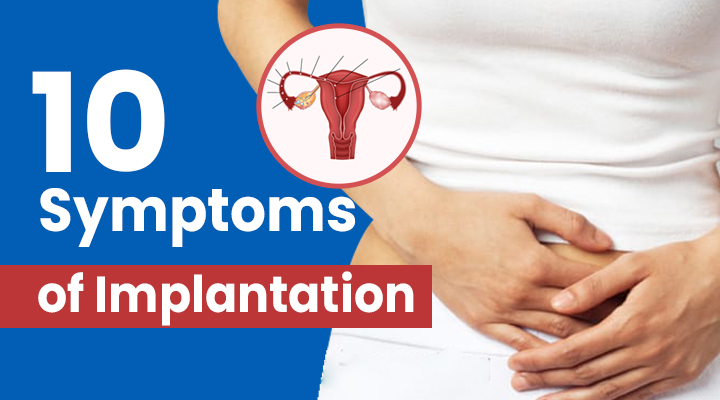10 Symptoms of Implantation – Signs of Successful Implantation
When you are trying to get pregnant, bleeding signs frustrate you. But ladies, don’t get disappointed! Now let’s talk about 10 Symptoms of Implantation and much more! This bleeding can be a sign of implantation. This is an early pregnancy symptom. From your bodily changes, you can pick the successful implantation symptoms. The symptoms include spotting, cramps, etc. Typically, they’ll start a few days before your menstrual cycle. 20-30% of women experience this symptom. But they’re mistaken it to be the beginning of their menstrual cycle.
10 Symptoms of Implantation – Definition, Process, Signs
What is Implantation?
The blastocyst/fertilized egg gets attached to the uterine lining. This is called implantation. It’s purely a natural process and is an early stage of pregnancy. It generally happens a week post-ovulation. People assume that pregnancy starts when the sperm meets the egg. The blastocyst implanting into the wall of the uterus marks the start of pregnancy. It generally happens 6-12 days post-fertilization.
What is the Process of Implantation?
Imagine you had unprotected sex on or before ovulation day. When the egg gets released, sperm are waiting in the fallopian tube. Now the egg is managed to get fertilized. This egg after fertilization starts to divide rapidly. Also travels down the fallopian tube nearing the uterus.
It enters the uterus and burrows inside the uterine wall to get attached to the wall. This process is called implantation. If it does not occur then pregnancy cannot occur that month. And the embryo can’t lead to a viable pregnancy.
The embryo begins to produce the hormone HCG after implantation. This hormone is detected in pregnancy tests. HCG will send a message to the corpus luteum to continue the production of progesterone.
During a nonpregnancy normal cycle, the corpus luteum discontinues progesterone production. Since this hormone is responsible to provide structure to the lining of the uterus. The menstrual period starts when progesterone levels drop. Whereas when HCG is produced by an embryo that is newly implanted, the corpus luteum gives it a signal to continue production of progesterone. The uterine lining remains intact and the period does not begin.
Can Women Feel Implantation Symptoms?
Many women try to pay close attention to their bodies when planning for pregnancy. But the process of the embryo attaching itself to the walls of the uterus does not produce any symptoms physically. You may note a few little changes such as implantation bleeding symptoms, but connecting them to pregnancy is unlikely. The embryo is minute in size. And so, it’s impossible to feel anything different in your body.
When the Signs of Implantation are Noticed?
The implantation process gets completed around 8-10 days post-ovulation. The embryo starts producing HCG hormone only once implantation is completed. And even after the process’s completion, it does take many days for the accumulation of HCG to get detected in a pregnancy test.
You can’t expect to see any signs of implantation until ovulation is past 10 days or so. If you aren’t pregnant, then the progesterone levels will drop. And will mark the beginning of your menstrual cycle. There are a few signs to detect early pregnancy. However, every woman should keep in mind that each pregnancy is unique and different. And so are the symptoms of implantation. Some women don’t notice any symptoms. We have listed below 10 signs and symptoms of implantation.
10 Symptoms of Implantation
1. Implantation Bleeding Symptoms or Spotting
This one is a predominant implantation symptom and a sign of gestation. Implantation bleeding symptoms occur when the embryo burrows itself into the uterine wall. So if you observe spotting or light bleeding before your menstrual cycle don’t stress. This bleeding is not heavy and red as regular menstrual bleeding. It is scanty and pinkish. Also, it does not form any clots and is also not consistent. The bleeding lasts for a couple of days and is not continuous.
2. Implantation Symptoms – Cramping
Another successful implantation symptoms involve cramping. This occurs after spotting. It’s very similar to period cramping. Though the cramps are mild and not very painful. It generally occurs in the lower abdomen, and back and will last for a few days. These cramps can also be associated with continuous contraction in the walls of the uterus. If it gets unbearable then you must contact your gynecologist.
3. Tender Breasts as Implantation Symptom
Soon after implantation, in many women, changes in breasts may provide one of the first symptoms of pregnancy before a missed period. Breasts may change in size or become swollen, sore, tingly, and tender. Some moms also feel fuller and heavier breasts. Rising levels of hormones may lead to the growth of breasts and they become sensitive. There can be other issues that can be related to breast changes. So, if you are getting a repeatedly negative pregnancy test, consult your doctor.
4. Food Cravings and Aversions in Implantation
Women’s likes and dislikes tend to change due to hormones. You’ll start liking and craving certain foods you always disliked and vice versa. Expecting women to crave food is different from one woman to another. You can pamper yourself by fulfilling those cravings. Also, avoid foods you don’t want to taste. But be sure of the nutrition and health quotient.
5. Rise in Basal Body Temperature
It’s your oral temperature when you first wake up in the morning. The basal body temperature (BBT) can be a way to determine pregnancy. And is generally high during implantation. Many pregnant women maintain charts. So, they can track their body temperatures. The basal body temperature increases during ovulation time. Also remains high till the process of implantation. This happens because of the increase in progesterone levels.
6. Frequent Urination
Within a few days after implantation, urination urge increases tremendously. Women’s body is undergoing a massive change to make space for the fetus. Due to this the blood supply in the pelvic area increases. Thereby putting pressure on the bladder. Frequent urination will continue. And rather intensify during the later months of pregnancy.
7. Hot Flashes
During implantation, the levels of hormones will change rapidly. This may result in hot flashes. They are signs of implantation that are not very common. This would last for about 15 – 20 minutes. Though this sign is not so consistent. So, you can consider it by other symptoms.
9. Cervical Mucus
The cervix swells and the blood flow to the cervix increases. This happens after implantation. And it is due to the increase in progesterone levels. Also, the glands begin to enlarge. And they produce an increased amount of cervical mucus due to hormone stimulation. The mucus may contain blood. This makes it appear brownish or pinkish in color post-implantation.
10. Headaches /Backaches
Headaches and pain in the lower back are among the 10 Symptoms of implantation. For this, it’s important to eat enough and have a healthy diet. A hot and cold compress can help in relieving the pain. To reduce the backache symptoms expecting women may start doing back exercises. This’ll help her to get rid of back pain. It’ll also strengthen the body.
Difference between Menstrual Bleeding and Implantation Bleeding
Below mentioned 4 features can help you to distinguish between implantation bleeding and menstrual bleeding:
- Quantity – Menstrual period bleeding is more in quantity. But implantation bleeding is only a few drops.
- Timing – Menstrual period bleeding happens about 7-13 days post ovulation. And implantation bleeding 14 days post ovulation
- Colour – A menstrual period is bright red usually. Implantation bleeding is more brownish.
- Bleeding Duration – Implantation bleeding lasts up to one day. A menstrual period will last 4-5 days.
Symptoms of Successful Implantation
How Can I Confirm if My Implantation Is Successful?
Having all signs of possibly successful implantation? But the pregnancy test is repeatedly coming negative? So, there may be less HCG hormone. This isn’t able to give a success sign yet. However, this hormone starts its production only once implantation is complete. It can take 10 days after the implantation process to produce and accumulate. So, enough amount of HCG is responsible to show positive results.
You can confirm your pregnancy by using the pregnancy test. Once you’ve implantation bleeding you can have a home pregnancy test after 3 days. The later you take the test, the better your chances of getting a correct result. Another way is to take an ultrasound test. In this, it’ll be visible if the embryo has attached itself to the walls of the uterus. Ultrasound at an early stage is not preferred. This can harm the delicate process of fetal development and implantation. Staying patient, being optimistic, and keeping a tab on the visible signs are important!










